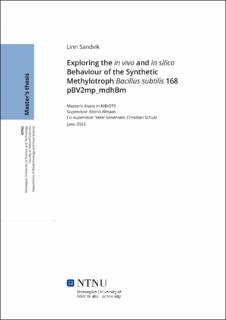Exploring the in vivo and in silico behaviour of the synthetic methylotroph Bacillus subtilis 168 pBV2mp_mdhBm
Master thesis
Permanent lenke
https://hdl.handle.net/11250/3089908Utgivelsesdato
2023Metadata
Vis full innførselSamlinger
Sammendrag
Bacillus subtilis er en type bakterie som er mye brukt som cellefabrikk i bioteknologisk industri (Su 2020). Bakterien kultiveres vanligvis med glukose som karbonkilde (Kleijn 2010), men det har oppstått en interesse for å finne alternative karbonkilder som ikke konkurrerer med matproduksjon. Et lovende alternativ er metanol som kan brukes som karbonkilde av såkalte metylotrofe mikroorganismer (Kleijn 2010). \emph{B. subtilis} er ikke en naturlig metylotrof, men det har blitt vist at syntetisk metylotrofi kan induseres i B. subtilis ved å få den til å uttrykke genet methanol dehydrogenase (Mdh). De syntetisk metylotrofe variantene av B. subtilis som har blitt fremstilt så langt, er imidlertid bare i stand til å bruke methanol som co-karbonkilde i tillegg til for eksempel glukose (Gao 2022). I vårt arbeid har vi utført eksperimentelle og in silico analyser for å bekrefte at B. subtilis faktisk er i stand til å bruke metanol som karbon kilde når Mdh er uttrykt. Dette ble gjort ved å utføre såkalte batch fermenteringer, hvor den muterte varianten B. subtilis 168 pBV2mp_mdhBm ble kultivert i minimalt medium som inneholdt glukose og metanol. Fenotypen til mutanten ble analysert eksperimentelt ved å måle biomassekomposisjon, aminosyrefordeling, vekstrate og opptaks- og sekresjonsrater av næringsstoffer og gasser. De eksperimentelle dataene ble også brukt til å oppdatere den nyeste tilgjengelige genomskala modellen (GEM) av B. subtilis, og den oppdaterte modellen ble brukt til å studere fenotypen til mutanten in silico. In silico analyser som ble utført er analyse av fluksbalanse (FBA) og fluksvariabilitetsanalyse (FVA). Disse analysene ble brukt for å undersøke distribusjonen av fluks gjennom det metabolske nettverket til mutanten. Resultatene fra eksperimentelle og in silico analyser stemmer overens med funnene som ble gjort av Gao et al. (Gao 2022), og viser at den muterte varianten er i stand til å bruke metanol som co-karbonkilde. Vi har også brukt resultatene våre for å foreslå videre analyser som kan utføres, for å føre oss nærmere en mutert variant av B. subtilis som kan bruke metanol som eneste karbonkilde. Bacillus subtilis is a bacterial strain that is much used as a cell factory in biotechnologicalindustry [1]. It is typically cultivated with glucose as the carbon source [2], however ithas become of interest to find alternative carbon sources that do not compete with foodproduction. A promising alternative is methanol, which can be used as a carbon sourceby so called methylotrophic microorganisms [3]. B. subtilis is not a natural methylotroph,but it has been demonstrated that synthetic methylotrohpy can be induced in B. subtilis bymaking it heterologously express a methanol dehydrogenase (Mdh) gene. However, thesynthetic methylotrophic B. subtilis strains that have been constructed so far are only ableto use methanol as a co-carbon source in addition to e.g. glucose [4]. In our work we haveconducted experimental and in silico analyses to confirm that B. subtilis is indeed able touse methanol as a carbon source when Mdh is heterologously expressed. This was doneby conducting batch fermentations where an Mdh-expressing mutant strain, B. subtilis 168pBV2mp mdhBm, was cultivated in minimal medium containing glucose and methanol.The phenotype of the mutant was analyzed experimentally by measuring the biomass com-position, amino acid distribution, growth rate, and uptake- and secretion rates of nutrientsand gas. The experimental data was also used to update the newest available genome-scalemetabolic model (GEM) of B. subtilis, which allowed us to study the phenotype of the mu-tant in silico. The in silico analyses that were conducted were flux balance analysis (FBA)and flux variability analysis (FVA), which were used to study the flux distribution throughthe metabolic network of the mutant strain. The results from the experimental and in silicoanalyses are in accordance with the findings of Gao et al. [4], and show that the mutantstrain can use methanol as a co-carbon source. Our results have also been used to proposefurther analyses that can be conducted to bring us closer to a mutant B. subtilis strain thatcan use methanol as the only carbon source.
